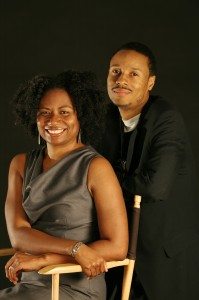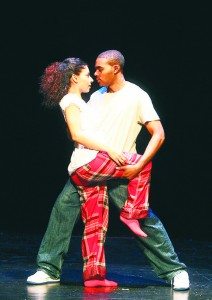

"Platanos and Collard Greens" debuted to sold-out audiences on June 27, 2003, and continues to enlighten and entertain audiences in Manhattan and on their college tour shows. Over the years, the play has undergone various changes. Most recently, Playwright/Producer David Lamb -- by way of audience demand -- added a West Indian character, thus expanding the African-American, Latino and Caribbean relations that the play explores with hilarity and insight. (As of September, the play has been retitled "Platanos, Collard Greens, and Callaloo".)
Lamb, a graduate of New York University School of Law, tackles the social and political issues within the Black and Latino communities in his play (which is adapted from 1995 released the novel "Do Platanos Go Wit' Collard Greens?") In many ways, the play is a comedic, modern-day "Romeo and Juliet". StageBuddy got a chance to speak with the intelligent playwright/producer to talk about comedy, politics, and what contributes to his show's longevity.
StageBuddy: Why is "Platanos" so successful?
David Lamb: What accounts for its longevity, why do people like it? We hear over and over again, "I didn't know I could laugh so hard." It's unique in its ability [to unite] comedy and politics -- and, in addition to that, it's a romantic story with characters people can relate to in their own lives.
SB: What lessons have you learned as a writer and producer?
DL: I've learned lessons; I don't know that I follow them. When we first began we were in the Producers Club and we had a whole set there. And I told the original director [Summer Hill Seven] we don't need a set, it's hip hop -- two turntables, and a mic. And he would say, "Why don't you sit on stage and read the book then?" because it was adapted from a book that I had written; and we would go back and forth.
Either the story works, or it doesn't. I've learned that you can do it without a set -- and you see that increasingly with minimalist sets like "Jersey Boys"; they don't have a set traditionally speaking. I've learned the hard way that it's not about growth, it's about net -- taking a lesson from yoga, I've learned that flexibility is strength. You have to be flexible and adaptable. We literally change the play around depending on certain things, but that's turned into an advantage -- because people come to see it again and again, because it becomes a whole new play. A producer's job is to inspire.
SB: How do you know what's funny and what's not?
DL: I am not capable of writing something that's not funny due to my own fears and hangups. I could not sit in a play as a writer and not have it be funny because I wouldn't know till the end if they liked it and I'd have a heart attack. So for me, funny is a health necessity.
I know [something is] funny if it makes me chuckle in the rehearsal or when I'm writing it. Does it make me chuckle? And does it make me chuckle again, and does it make me chuckle for a third time? If it makes me chuckle for a third time, I'm pretty sure it will make the audience laugh. What I know from watching the show over a thousand times is that misdirection is funny -- leading the audience one way and surprising them with something they didn't see coming, audiences love that. Showing the stereotype and making fun of it; having characters believe it, and the ridiculous of it being exposed.
SB: How do you get the seats filled?
DL: I just asked someone who's been in this longer than me, and she said, "I don't know." And to that I say, "I don't know" as well. It's changed so much, it's really, really, really, really, really hard. When we first began, we could rely on radio. If we could rely on radio now the way we did then, we could have four times as many shows -- but what has happened is the economy has shifted; the people who used to advertise on TV have switched over to radio, and they've priced the little person out. Just in the last six months, the radio price has tripled, so then you're stuck with, "how the hell am I going to manage that?"
If you have a good show, word of mouth is big. Choosing the right dates. Certain e-blasts work, and some don't. Establishing relationships with groups: group sales are gigantic.
 SB: When did you know you had a hit show?
SB: When did you know you had a hit show?
DL: I knew the first day in rehearsal. The actors were really nervous -- I say that boldly because I was nervous as well. I'll tell you this as lessons: as producer, remember to reserve seats for yourself. The first date we had no seats, so Jamillah [Jamillah Lamb, Co-Producer/Co-Founder Between the Lines Production] and I couldn't see the show opening night. We never saw the opening night show. We stood outside the door and listened and waited for the first laugh -- and then they laughed and then they laughed again and kept laughing. At intermission there were some guys that came out and got on their cellphones and were saying, "You have to go see this play, this play is great." And that's why Doni Comas [current Director] and I are constantly on the actors; we tell them you're settling for good, I don't want to just do it if it's just good, if we're not striving to be great. We know when it's great. When it's great they come out and they're calling people; you can see it immediately, there is a buzz.
SB: Anyone in politics current or in the past that could represent "Platanos"?
DL: Felipe Luciano without a doubt; he is the show. He is a Puerto Rican guy: he grew up in East Harlem, a member of the Last Poets, one of the early spoken word groups which evolved into Hip Hop. This Puerto Rican guy along with two African Americans founded the Last Poets. Simultaneously, he was the leader of the Young Lords, which was an organization somewhat comparable to the Black Panthers -- less militant -- that was involved and trying to change things in their community. He's an inspiration, and when he came to see the play I surprised the actors. A quote from him: "I've been waiting for this play my whole life."
SB: Advice to a young writer or producer?
DL: Try not to take things personally. People say that, but learn how to do it; I'm still trying to learn. For a writer, its not about writing, it's about rewriting. You have to be willing to rewrite your stuff and not be rigid and stuck, and be willing to re-examine what you're working on. As a producer, hire good people, hire good people, hire good people; know your budget, know your budget, know your budget; don't get emotional; know why you're doing it. Are you doing it to get money? is it a non-for-profit production? who are you trying to reach? Give yourself enough time to get your material together before you produce the play -- it takes longer than you think -- give yourself more time than you think you need.
(This interview has been edited and condensed.)
For more information on "Platanos, Collard Greens, Y Callaloo", check out our event listing here: https://stagebuddy.com/listingdetail.php?lid=16368